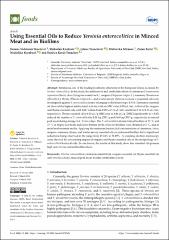| dc.contributor.author | Vidaković Knežević, Suzana | |
| dc.contributor.author | Knežević, Slobodan | |
| dc.contributor.author | Vranešević, Jelena | |
| dc.contributor.author | Milanov, Dubravka | |
| dc.contributor.author | Ružić, Zoran | |
| dc.contributor.author | Karabisl, Neđeljko | |
| dc.contributor.author | Kocić Tanackov, Sunčica | |
| dc.date.accessioned | 2024-03-14T07:07:23Z | |
| dc.date.available | 2024-03-14T07:07:23Z | |
| dc.date.issued | 2024 | |
| dc.identifier.citation | : Vidakovi´c Kneževi´c, S.; Kneževi´c, S.; Vraneševi´c, J.; Milanov, D.; Ruži´c, Z.; Karabasil, N.; Koci´c-Tanackov, S. Using Essential Oils to Reduce Yersinia enterocolitica in Minced Meat and in Biofilms. Foods 2024, 13, 806. https://doi.org/ 10.3390/foods13050806 | en_US |
| dc.identifier.issn | 2304-8158 | |
| dc.identifier.uri | https://repo.niv.ns.ac.rs/xmlui/handle/123456789/772 | |
| dc.description.abstract | Yersiniosis, one of the leading foodborne infections in the European Union, is caused by
Yersinia enterocolitica. In this study, the antibacterial and antibiofilm effects of cinnamon (Cinnamomum
zeylanicum Nees), clove (Syzygium aromaticum L.), oregano (Origanum vulgare L.), rosemary (Rosmarinus
officinalis L.), thyme (Thymus vulgaris L.), and winter savory (Satureja montana L.) essential oils were
investigated against Y. enterocolitica strains belonging to the bioserotype 4/O:3. Cinnamon essential
oil showed the highest antibacterial activity, with an MIC value 0.09 µL/mL, followed by oregano
and thyme essential oils, with MIC values from 0.09 to 0.18 µL/mL, and from 0.18 to 0.23 µL/mL,
respectively. Thyme essential oil at 0.23 µL/g (MIC) and at 0.46 µL/g (2MIC) significantly (p < 0.05)
reduced the number of Y. enterocolitica by 0.38 log CFU/g and 0.64 log CFU/g, respectively, in minced
pork meat during storage at 4 ◦C for 4 days. The Y. enterocolitica strains formed biofilms at 15 ◦C and
37 ◦C in tryptic soy broth and Luria–Bertani broth, while no biofilms were obtained at 5 ◦C, and in
meat broth nutrient media. Applying the minimum bactericidal concentrations of cinnamon, clove,
oregano, rosemary, thyme, and winter savory essential oils on preformed biofilms led to significant
reductions being observed in the range from 45.34% to 78.89%. A scanning electron microscopy
assay showed the devastating impact of oregano and thyme essential oils on the morphology of Y.
enterocolitica bacterial cells. In conclusion, the results of this study show that essential oils possess
high anti-Yersinia and antibiofilm effects. | en_US |
| dc.description.sponsorship | This research was funded by the Ministry of Science, Technological Development and
Innovation of the Republic of Serbia by the contract of implementation and funding of research work
of NIV-NS in 2024, Contract No: 451-03-66/2024-03/200031 and by the Provincial Secretariat for
Higher Education and Scientific Research, Republic of Serbia, Autonomous Province of Vojvodina
(No. 142-451-3498/2023-01/01). | en_US |
| dc.language.iso | en | en_US |
| dc.source | Foods | en_US |
| dc.subject | Yersinia enterocolitica | en_US |
| dc.subject | cinnamon essential oil | en_US |
| dc.subject | oregano essential oil | en_US |
| dc.subject | thyme essential oil | en_US |
| dc.subject | anti-Yersinia activity | en_US |
| dc.subject | minced pork meat | en_US |
| dc.subject | biofilm | en_US |
| dc.subject | antibiofilm activity | en_US |
| dc.title | Using Essential Oils to Reduce Yersinia enterocolitica in Minced Meat and in Biofilms | en_US |
| dc.type | Article | en_US |
| dc.identifier.doi | 10.3390/foods13050806 | |
| dc.citation.volume | 13 | en_US |
| dc.citation.spage | 806 | en_US |
| dc.citation.rank | M21 | en_US |
| dc.type.version | published | en_US |

